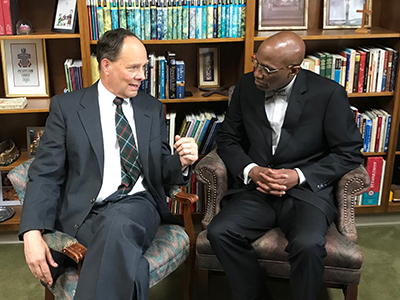On a spring day in 1819, a small group of people gathered to worship on some land at the city cemetery in what was a pioneer town called Bowling Green, Kentucky. Little did that group know how far that new church would go.
This past weekend, the Presbyterian Church of Bowling Green celebrated 200 years and the Rev. Dr. J. Herbert Nelson, II, Stated Clerk of the General Assembly of the Presbyterian Church (U.S.A.), was there to celebrate with them. Nelson preached for the special service and spent time in fellowship with the congregation.
The church’s pastor, the Rev. Dr. Matthew Covington, was the guest in this week’s pre-taped episode of “Coffee with the Clerk.” He said the church recently wrote a mission statement, “Sharing the vitality of Christ. Loving, serving, welcoming all.” He added that the church has worked to keep the statement alive by its actions, which includes stepping outside of the historic church building and into the community.
“We love the building and it is dear to the heart of the congregation, but what about those on the sidewalks in the community or downtown?” Covington asked. “We have this footprint, so how do we meet and get to know them and give them a sense that they are welcome here?”
Recently, Covington borrowed an idea from the Episcopal Church and tried a new outreach on Ash Wednesday.
“Our church is right next to the county courthouse, and people come here frequently, so we took a sign and I was dressed in my robe and stole, and we offered people ashes to go,” he said. “We would speak briefly to people, telling them that the ashes are a symbol of sadness but also God’s willingness to forgive. All of us come from dirt, but that’s not where we are headed, and that message seemed to resonate with those on the sidewalk.”
Covington said that people are hurting, uncertain and fearful. He wants the church to carry a message of welcome, encouragement and emotional safety.
Early in the 19th century, Bowling Green was a small speck on the map where people would stop to get water from the cold, limestone spring.
“A couple of tavern owners gave land to what was known as Pioneer Cemetery and the church first located there. It was not only born out of a cemetery but born out of the generosity of two tavern owners,” said Covington. “It’s amazing what God can do with the circumstances that are presented. God has brought this church out of a cemetery and provided a ministry to the whole community. The community from the beginning was supportive of the church. That continues today. This has helped to fuel our understanding of what our mission should be.”
In addition to being the home of Western Kentucky University, Bowling Green also has a strong medical presence. The University of Kentucky has expanded its medical college to the region.
“The town is spread out, and although we sometimes see downtown churches dwindling, we have a different circumstance,” he said. “This downtown church is more alive than ever and is reaching people.”
Part of that outreach has been to host an art gallery for several years, allowing local artists and others to display their work. Covington says it is one of many things the church has embraced to help build community connections.
“Four years ago, we started doing a program called Room in the Inn. It was started in Nashville, and we took one night a week (Thursday) to welcome the homeless, feed them a meal and give them a place where they are safe physically and emotionally,” he said. “They know nothing bad will happen to them while they are here. It was a sign to me how willing the congregation is to be present for people, and we’ve had more food donated than you could possibly eat.”
Covington, who has served as pastor for more than 16 years, says the spirit of God is undergirding their work and leading them forward.
“We are not in this alone. The divisions that come or disagreements we have are things we can learn from,” he said. “We don’t avoid conflict, but there is something much more beautiful around the corner for us and that hopefulness has been communicated to the congregation.”

